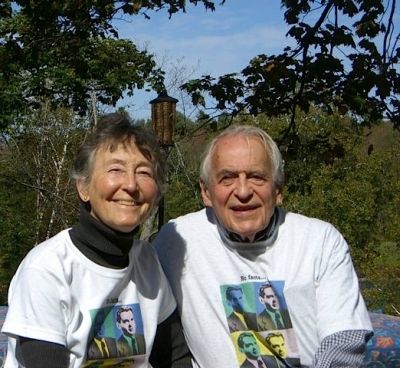 Lloyd and Sussane Rudolph -- two University of Chicago professors who started studying Indian politics in the 1950s, have been named the winners of the Padma Bhushan Award.
Lloyd and Sussane Rudolph -- two University of Chicago professors who started studying Indian politics in the 1950s, have been named the winners of the Padma Bhushan Award.
The Rudophs -- Lloyd and Sussane have made India their second home. They first travelled to India in 1956 when they drove all the way from London in most uneasy conditions traversing several continents just after both obtained their PhDs from HarvardUniversity in the United States.
The couple jotted down the first part of their travel experience in the Land Rover passing through one country to another on horrible bumpy roads.
But the second half was written at greater leisure from notes as they recuperated from the trip in Lahore, New Delhi, and Jaipur. This was the beginning of their romance with India.
The Rudolphs started their academic life almost together after doing their PhD and after teaching in The University of Chicago for 34 years both Lloyd and Sussane retired at the same time so that they can do things together. The Rudolphs have authored several books together by doing extensive research. They spent more than a decade in India, particularly in Jaipur to write books and articles.
Their writing on India on a variety of subjects did not go unrewarded. The Republic Day honours listed the Rudolphs with Padma Bhushan. It is for the first time since the inception of the coveted national awards that a foreign couple was honoured with Padma Bhushan.
“The news came in Kensington, California, where we have our home. We are grateful to our friends who recognised our work. We are particularly thankful to Nirupama Rao, who was until recently India’s Ambassador in US,” says Lloyd.
“She worked to see that we are rewarded. We first reached India in 1956 under the foreign area training grant as Ford Foundation scholars and travelled in a Land Rover. It was a memorable experience and now we have found time to write about this experience,” he adds.
We are finishing up a book to be published by the Oxford University Press on our journey by road from London to Jaipur entitled Destination India: Overland From London To India And What We Learned There,” said Lloyd from Kensington.
They first stayed in Jaipur for six months and then moved to Chennai. But it was Jaipur that fascinated them.
“Even our children have happy memories about Jaipur as they studied here and my daughter Amelia was married in true Indian style at the Narayan Niwas several years ago,” said Lloyd.
The meeting with former Noble Late Thakur Mohan Singh Kanota was most productive as they jointly wrote the book -- Reversing the gaz based on the 89 volumes of the Amar Singh diary. The Rudolphs lived in Jaipur initially for five of seven research years.
Then they decided to make Jaipur their second home in 1984.
The Rudolphs worked together and their first book on Rajasthan essays on Rajputana is about the history, culture and character, and administration of India’s princely states in the 19th and 20th centuries. They bring to bear the perspective and concerns of several social sciences on the princely and feudal orders under paramountcy in the 19th century and on their demise after independence.
The nature of their evidence ranges from the material they gathered as participant observes in the midst of the political struggle over Jagir Abolition Act in the 1950s.
These days, the Rudolphs divide their time between Kensington, California, Barnard, Vermont and Jaipur. They find January to March the best time to live in Jaipur.
“Over the course of the years, I co-authored eight books with Sussanne . The Modernity of Tradition: Political Development in India; Education and Politics in India ; The Regional Imperative: The Administration of US Foreign Policy Towards South Asian States Gandhi: The Traditional Roots of Charisma; Essays on Rajputana; In Pursuit of Lakshmi: The Political Economy of the Indian State; Reversing the Gaze: The Amar Singh Diary, a Colonial Subject’ s Narrative of Imperial India and, most recently, Postmodern Gandhi and Other Essays: Gandhi in the World and at Hom,” said Rudoph.
Reversing The Gaze :The Amar Singh Diary: A Colonial Subject’s Narrative of Indian State is based on the diary provided by Thakur Mohan Singh Kanota, a Rajput nobleman and officer in the Indian Army, who kept a diary for 44 years from 1898, when he was 20, until his death in 1942.
He wrote about the Jodhpur court, the Imperial Cadet Corps, and the British Expeditionary Force in China during the Boxer rebellion (1899-1901).
The couple’s book The Pursuit of Lakshmi, is a metaphor for the aspirations of the state and people of independent India. The book focuses on this modern-day pursuit by offering a comprehensive analysis of India's political economy.
The Pursuit of Lakshmi talks about how India occupies a paradoxical plane among nation states: it is both developed and underdeveloped, rich and poor, strong and weak. These contrasts locate India in the international order. Contrary to what one might expect in a country with great disparities of wealth, no national party, right or left, pursues the politics of class.
India faces a ‘third actor’ -- the state. Because of the dominance of the state makes class politics marginal, the state is itself an element in the creation of the centrist-oriented social pluralism that has characterized Indian politics since independence.” said Lloyd.
In analysing the relationship between India's politics and its economy, the Rudolphs maintain that India's economic performance has been only marginally affected by the type of regime in power -- authoritarian or democratic. More important, they show that rising levels of social mobilisation and personalistic rule have contributed to declining state capacity and autonomy.





